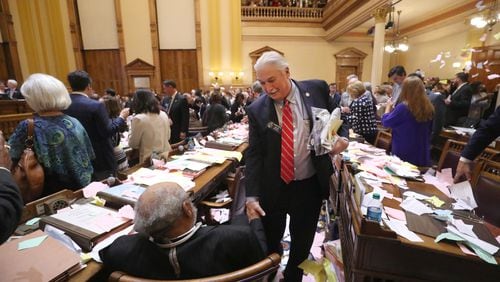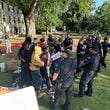Kristen Stampfer said she spent about $400 and took an entire day off of work to travel from Bulloch County to the Georgia State Capitol in Atlanta to speak against a controversial proposal that would allow privately owned water utilities on the coast to serve new development without local government approval.
But Stampfer and others who’d traveled from far away were not allowed to speak Tuesday about House Bill 1146, which they fear could contaminate their drinking water and drive up their bills.
The bill has already passed the state House and was voted out of the Senate natural resources committee after Tuesday’s hearing.
Supporters of HB 1146 say the legislation is needed to boost housing construction near the $7.6 billion Hyundai Motor Group electric vehicle factory along I-16 in Bryan County. The EV factory, also known as the Metaplant, is Georgia’s largest economic development project with 8,500 promised jobs.
But the issue of water for the plant and other development surrounding the factory has generated controversy in Bryan and neighboring Bulloch counties, and HB 1146 is opposed by conservation groups and some residents. Many farmers in the area are concerned about plans to drill wells in Bulloch County into the Floridian Aquifer, though state officials have tried to assure residents that there is plenty of supply.
“It was just very disheartening to see that that’s how our government works,” said Stampfer, a professional farm manager who also has a small family farm. “They don’t care, they’ve already had their mind made up and they don’t want to hear from you.”
Stampfer runs a community Facebook page dedicated to the issue with nearly 3,000 members. She said she was one of at least five people who had travelled long distances to attend the Senate natural resources committee hearing and denied an opportunity to speak against the bill.
Sen. Frank Ginn, R-Danielsville, a committee member, urged chairman Lee Anderson to let residents speak.
“You’ve got some folks that came all the way up here from Bryan County,” Ginn said. “That’s a long way to come to a committee meeting to testify and I’d love to spend a little more time and let more of them be heard.”
“Well, we got a time limit, we got to move forward,” Sen. Anderson replied.
Anderson said he would limit both the supporting and opposing sides to two speakers and four minutes.
Anderson allowed the bill’s sponsor and the owner of a private water system that would be the primary beneficiary of the law to speak and field questions freely for 20 minutes. Anderson then called on Bryan County representatives who said the county has already spent about $150 million out of a planned $360 million investment in water and sewer expansion.
About $120 million of that money is debt the county was planning to repay using the expanded customer base it could lose to a private water provider if HB 1146 were to become law.
Anderson cut the county representatives off after four minutes, saying he would “come back” to allow lawmakers to ask questions. He never did.
The second opposition speaker, Pam Burnett of the Georgia Association of Water Professionals, noted that other organizations that opposed the bill and were not allowed to speak included the associations representing Georgia counties and municipalities. None of the coastal residents who attended the hearing were allowed to speak in opposition.
The committee vote to approve the bill was 9 to four with members of both parties voting for and against.
The committee then heard a five-minute presentation from a high school student who helps run a Christian outdoor program for sick children.
HB 1146 must be scheduled for a full Senate vote before it could go to Kemp to sign into law. Anderson could not be immediately reached for additional comment.
A note of disclosure
This coverage is supported by a partnership with Green South Foundation and Journalism Funding Partners. You can learn more and support our climate reporting by donating at ajc.com/donate/climate/







